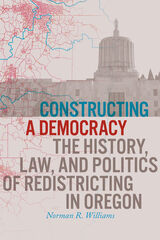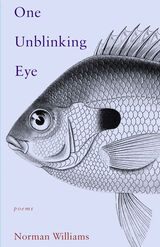
In Constructing a Democracy, legal scholar Norman Williams presents a comprehensive history of legislative and congressional redistricting in Oregon. Because redistricting impacts the representativeness of the ensuing legislative body, Oregon’s constitutional framers, legislators, and courts alike have understandably focused on developing legal rules to constrain the redistricting process. Williams is primarily interested in identifying and understanding the scope of those rules: What legal constraints have existed over time? How aggressively have the courts enforced those restraints? How have political actors undertaken the redistricting task in light of the various rules and the judicial pronouncements regarding those constraints?
The redistricting process in Oregon has not drawn national attention the way it has in states like North Carolina and Pennsylvania. But the process in Oregon is notable in several ways, including an early attention to malapportionment, the use of the initiative to reform the process, and and the impact of women leaders on the redistricting process. The Oregon process, however, has also notably lagged behind other states, particularly in considering issues of race and minority representation and preventing gerrymandering.

The poems in One Unblinking Eye cast a steady and serious gaze at life outside the beltways. Whether testifying at a prayer meeting in Indiana, tramping the backwoods of northern New England, or working on an oil derrick in the Gulf, the inhabitants of these poems live on the margins of society. “They are the left-behind, odd-manneredones/Who speak in starts,” Norman Williams writes of the last residents of a West Virginia mining town. Describing the woods of central Maine, he speaks of “lives … scraped from sides/Of deer and garden plots; where double-wides,/On concrete pads abut a hard-pan road.”
It is the art of these poems to convince the reader that these lives matter. There is desperation here, and madness, but there is an equal measure of determination and faith. In one poem, Mr. Williams writes of a fisherman haunted by his daughter’s death, who “casts his line/In hopes a flash and strike will draw him back.” These words describe the poet’s method as well. The work in this collection is built on a supple metrical foundation; it is filled with glancing rhymes and wordplay; and it is touched off by striking images. It is, in other words, composed with care, and it richly rewards a careful reading.
Norman Williams writes in Burlington, Vermont, where he works as an attorney. His first book, The Unlovely Child, was published by Alfred A. Knopf to enthusiastic reviews. Anthony Hecht wrote that “the voice of these poems is marvelously modulated, low-key in its acceptances, modest in its exultations, steady and unintoxicated in its long vision. It is my fixed conviction that with his first book he has fashioned a landmark in our literature, and sounded a uniquely American note with beautiful certainty.”
With his second book, more than fifteen years in the making, Norman Williams reafirms the truth of that assessment.
READERS
Browse our collection.
PUBLISHERS
See BiblioVault's publisher services.
STUDENT SERVICES
Files for college accessibility offices.
UChicago Accessibility Resources
home | accessibility | search | about | contact us
BiblioVault ® 2001 - 2024
The University of Chicago Press









